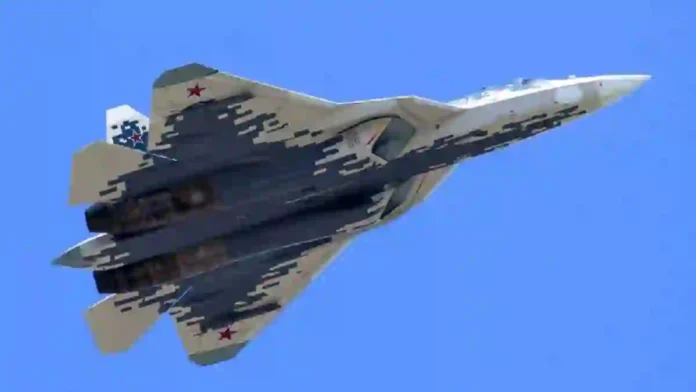MOSCOW: After Russia invaded Ukraine in 2022, the participation of its arms manufacturing complex in international military exhibitions sharply declined. Once regulars at exhibitions like IDEX in Abu Dhabi, Eurosatory in Paris, or DSEI in London, Russian manufacturers now largely showcase their equipment locally or in countries that remain Moscow’s allies post-2022.
Recently, the Egyptian International Air Show saw a rare appearance of Russian manufacturers with a substantial display of their weapon systems. Notably, the Su-57E export version was on exhibit, underscoring Africa’s strategic importance to Russia.
In Africa, Algeria and Egypt are key potential buyers of the Russian Su-57 fighter jet. Algeria, in particular, has made headlines by reportedly signing a contract to acquire 14 Su-57 fighters for nearly $2 billion, with deliveries slated to start in 2025.
The evolving regional dynamics are playing a significant role here. Take Algeria, for example. After Morocco acquired advanced F-16 fighters from the U.S., Algeria felt the need to bolster its own defences. Currently, about 67% of Algeria’s military hardware comes from Russia.
Meanwhile, Egypt is also showing interest in the Su-57. There have been discussions regarding its potential acquisition, although no contracts have been signed yet. The Egyptian Air Force is in the process of modernizing its fleet, and adding advanced capabilities like the Su-57 could significantly enhance its operational effectiveness.
Russian manufacturers, especially Rosoboronexport, are optimistic about the Su-57’s market prospects in Africa. Alexander Mikheev, the general director of Rosoboronexport, mentioned that ongoing consultations with strategic partners in various regions, including Africa, could lead to the supply and potentially even joint production of the Su-57.
These nations are determined to build up their defence manufacturing capabilities domestically. This means not just assembling aircraft, but also establishing local production of components and facilitating technology transfers. This approach is part of Russia’s broader strategy to strengthen military ties and defence cooperation in Africa, signaling a significant effort to increase its influence in the region.
Beyond interest from African countries, several nations outside the continent are also showing a strong interest in acquiring the Su-57 fighter jet by 2024.
India, a long-term defence partner of Russia, is actively exploring the acquisition of the Su-57 to modernize its Air Force. These discussions include potential collaborations in joint development and technology transfer, which align with India’s strategic goal of boosting its own defence production capabilities.
Besides that, Southeast Asian nations like Vietnam and Indonesia are actively looking into acquiring the Su-57 to bolster their defence amid regional security tensions.
Vietnam’s interest in the Su-57 fighter jet has led to numerous discussions and negotiations to upgrade its air combat prowess. Particularly in 2024, Vietnam has been in talks with Russian conversations have officials regarding the potential purchase of the Su-57. These occurred during various defence exhibitions and bilateral meetings, highlighting the growing defence relationship between Vietnam and Russia.
For instance, during the MAKS 2024 air show in Zhukovsky, Russia, Vietnam’s defence delegation explored opportunities for military cooperation, including the Su-57. In these talks, Vietnamese officials showed keen interest not only in procuring the aircraft but also in exploring joint production or technology transfer.
Read- India Conducts Successful Trials of ‘Highly Versatile’ Light Tank Zorawar
The Su-57 captures Vietnam’s attention for several compelling reasons. It’s a fifth-generation stealth fighter renowned for its advanced capabilities, such as superior maneuverability, long-range engagement, and evasion of detection. These features are particularly attractive to Vietnam, which faces potential threats in its airspace and maritime regions from neighboring powers.
Moreover, Vietnam aims to diversify its defence procurement sources beyond traditional suppliers. The Su-57 offers a strategic opportunity to elevate its operational capabilities while solidifying its defence relations with Russia, a historical key supplier of military equipment to the nation.
The increasing interest from countries like India, Egypt, Algeria, and Vietnam in acquiring the Su-57 fighter jet underscores a broader trend. Nations are actively seeking to modernize their military capabilities in response to a complex and often volatile geopolitical environment.
As nations strive to boost their air power with cutting-edge defence technologies, they must navigate a multitude of challenges. These include balancing delicate international relations, securing technology transfer agreements, and managing budget constraints.
The current geopolitical landscape, fraught with rising tensions in regions like the Asia-Pacific and the Middle East, intensifies the urgency of these defence procurement efforts. These countries will have to tackle issues such as the complexities of negotiating joint production agreements, dependence on a single supplier, and incorporating new technologies into their existing military structures.
When exploring the potential of the Su-57, their success hinges not just on acquiring advanced aircraft. It will also depend on how adeptly they manage these complex challenges while safeguarding their national security interests.
Agencies




